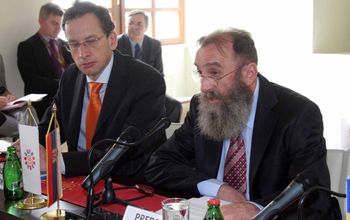- Serbia
Get to know Serbia
- Citizens
Culture and science
Health services
Pension and disability insurance
- Business
Employment
Economy
- Media
- Government
- Contact
Keep in touch
Contact form
Back
Keepin touch
Whether you have a question, comment, suggestion or any problem in the purview of the government, send us your message and we will try to respond as soon as possible. If your problem is not in our purview, we will forward your message to the relevant institution.
Q:
A:
Audiovisual policy priority in Serbia’s presidency over Council of Ministers of Culture
Belgrade,
20 April 2012
Minister of Culture, Media and Information Society Predrag Markovic today opened the annual ministerial conference of the Council of Ministers of Culture of South-East Europe at the Yugoslav Film Archives.
Markovic recalled that in April 2011 Serbia took over the presidency of the Council from Romania and that prior to that event, an annex to the Council’s Charter was adopted in Bucharest, which meant that Serbia was allocated the task of being the first to implement it.
The Minister noted that Serbia’s priorities during the presidency were focused on audiovisual policy measures, as a way to respond to the economic crisis.
Thus, a Law on cinematography was adopted and a new building for the Yugoslav Film Archives completed, therefore Serbia is now able to put the treasures kept in the Archives at the disposal of experts, researchers and users.
Markovic recalled that two expert conferences were held – “Crisis and the film industry in south-east Europe – challenges in financing microbudget films” and “Protection and preservation of audiovisual heritage in south-east Europe”, the conclusions of which will be incorporated in a declaration to be adopted later in the day.
The Minister asked all former Yugoslav republics to endorse the initiative of Serbia and UNESCO’s Regional Office in Venice to organise a joint exhibition in the Auschwitz-Birkenau concentration camp.
State delegations from 12 countries are participating in this year’s conference, including observes from Austria, the Council of Europe, EU Delegation to Belgrade and UNESCO’s Regional Office in Venice.
After the declaration is adopted, Serbia will officially hand over the presidency to Slovenia.
The Minister noted that Serbia’s priorities during the presidency were focused on audiovisual policy measures, as a way to respond to the economic crisis.
Thus, a Law on cinematography was adopted and a new building for the Yugoslav Film Archives completed, therefore Serbia is now able to put the treasures kept in the Archives at the disposal of experts, researchers and users.
Markovic recalled that two expert conferences were held – “Crisis and the film industry in south-east Europe – challenges in financing microbudget films” and “Protection and preservation of audiovisual heritage in south-east Europe”, the conclusions of which will be incorporated in a declaration to be adopted later in the day.
The Minister asked all former Yugoslav republics to endorse the initiative of Serbia and UNESCO’s Regional Office in Venice to organise a joint exhibition in the Auschwitz-Birkenau concentration camp.
State delegations from 12 countries are participating in this year’s conference, including observes from Austria, the Council of Europe, EU Delegation to Belgrade and UNESCO’s Regional Office in Venice.
After the declaration is adopted, Serbia will officially hand over the presidency to Slovenia.
-
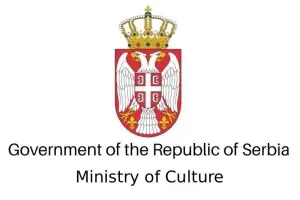 Belgrade, 10 November 2025
Belgrade, 10 November 2025Initiative to ban photo exhibition “Serbian Woman” attack on historic memory
-
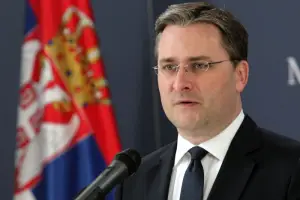 Belgrade, 8 November 2025
Belgrade, 8 November 2025Croatia obliged to respond adequately to emergence of hatred, extremism against Serbs
-
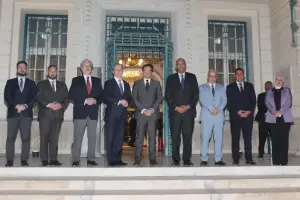 Belgrade/Cairo, 3 November 2025
Belgrade/Cairo, 3 November 2025Culture as foundation for enhancing overall relations between Serbia, Egypt
-
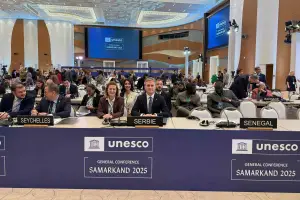 Belgrade/Samarkand, 31 October 2025
Belgrade/Samarkand, 31 October 2025Serbia’s continued commitment to preservation of cultural heritage
-
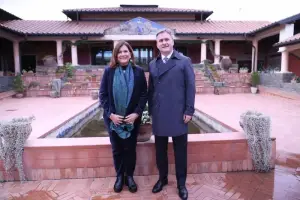 Požarevac, 24 October 2025
Požarevac, 24 October 2025Strengthening cooperation with Cyprus in field of cultural heritage protection
-
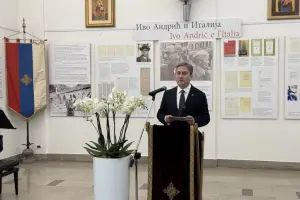 Belgrade/Trieste, 18 October 2025
Belgrade/Trieste, 18 October 2025Exhibition on Ivo Andrić in Trieste new bridge of cultural cooperation with Italy
-
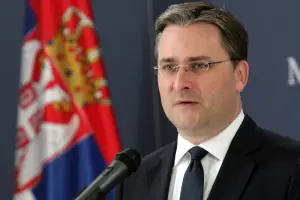 Belgrade, 7 October 2025
Belgrade, 7 October 2025Condemnation of marking Serbian cultural heritage as Albanian
-
 Belgrade/Osaka, 5 October 2025
Belgrade/Osaka, 5 October 2025Virtual promotion of Serbian tradition, culture in Osaka
-
 Belgrade/Barcelona, 1 October 2025
Belgrade/Barcelona, 1 October 2025Cultural heritage as foundation of preserving national identity
-
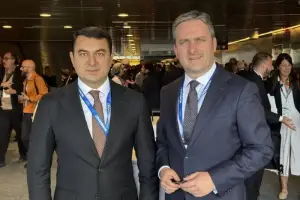 Belgrade/Barcelona, 29 September 2025
Belgrade/Barcelona, 29 September 2025Cultural cooperation between Serbia, Azerbaijan to further strengthen overall relations

